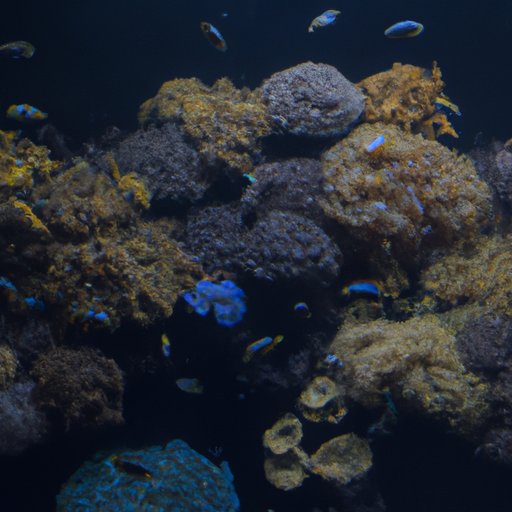Introduction
A habitat is a home for an organism or species. It provides the necessary resources for survival such as food, water, shelter, and space. In science, this term has been used to describe the physical environment that organisms inhabit, as well as the biological community that exists within it. There are many different types of habitats, ranging from aquatic to terrestrial, and they are all essential to maintaining a healthy and balanced ecosystem.
Investigating Different Types of Habitats
Aquatic habitats are those found in bodies of water like rivers, lakes, and oceans. They provide a unique habitat for many species of fish, amphibians, and other aquatic organisms. These habitats are often characterized by their water temperature, depth, and salinity. For example, coral reefs are highly productive ecosystems that are teeming with life due to their warm waters and abundance of nutrients.
Terrestrial habitats are found on land and include forests, grasslands, deserts, and tundra. These habitats are characterized by their vegetation, soil type, and climate. Forests, for example, provide homes for many species of animals, including birds, mammals, reptiles, and insects. Grasslands are also important habitats for many species, providing them with food sources and protection from predators.
Marine habitats are located in the ocean and include coral reefs, estuaries, and intertidal zones. These habitats are characterized by their salt content and the presence of various marine organisms. Coral reefs are incredibly diverse ecosystems, providing homes for many species of fish and invertebrates. Estuaries provide vital nursery grounds for a variety of fish and shellfish species, while intertidal zones are often home to a variety of marine algae and invertebrates.

Exploring the Impact of Human Activity on Habitat Loss
Human activities such as deforestation, pollution, and over-harvesting can have a devastating impact on habitats. Deforestation destroys natural habitats, reducing biodiversity and disrupting the balance of nature. Pollution can contaminate water sources, making them uninhabitable for aquatic species. Over-harvesting can deplete populations of certain species, leaving them vulnerable to extinction.
According to a study published in the journal Nature Communications, “Human activities have caused more than half of the world’s terrestrial habitats to be modified or destroyed since the year 1700.” This is alarming news for many species, as it means their habitats are disappearing at an unprecedented rate. Humans must take steps to protect these habitats if we want to ensure the survival of these species.
Examining How Climate Change is Affecting Habitats
Climate change is also having an effect on habitats. Rising sea levels are causing coastal habitats to disappear, while increasing temperatures are disrupting the balance of aquatic ecosystems. Changes in rainfall patterns are also impacting some terrestrial habitats, making them less hospitable for certain species.
A study published in Science Advances found that “climate change is projected to cause substantial changes in the distributions of species, particularly in areas already strongly affected by human activities.” This shows that climate change is exacerbating the effects of human activity on habitats, and could lead to the extinction of many species if nothing is done to protect them.

Discussing Animal Behavior in Relation to Habitats
Animal behavior is also closely tied to habitats. Migration patterns are often determined by the availability of food sources, and breeding habits are heavily influenced by the presence of suitable nesting sites. The availability of prey can also determine where certain species live, as they need to be close to their food sources in order to survive.
A study published in the journal Nature Communications found that “animals may move in response to changes in their environment, but the magnitude of these movements is limited by the availability of suitable habitats.” This shows that the availability of habitats plays a key role in determining animal behavior, and highlights the importance of preserving these habitats for the benefit of wildlife.

Understanding the Benefits of Preserving Habitats
Preserving habitats is essential for maintaining a healthy and balanced ecosystem. Biodiversity is increased when habitats are preserved, as it allows for more species to thrive in the same area. Ecological balance is also maintained, as different species rely on each other for survival. Finally, preserving habitats can also have economic benefits, as they can be used for tourism and recreation.
A study published in the journal Science Advances found that “preserving habitats can help maintain the natural capital that is so important for human wellbeing.” This shows that preserving habitats can have numerous benefits, both for the environment and for humans. By taking steps to protect habitats, we can ensure the survival of many species and promote a healthier planet.
Conclusion
Habitats are essential for the survival of many species, and it is important that we take steps to protect them. Different types of habitats provide homes for a variety of organisms, and human activities can have a devastating impact on these habitats. Climate change is also having an effect on habitats, and could lead to the extinction of many species if nothing is done to mitigate its effects. Animal behavior is closely linked to habitats, and preserving habitats can have numerous benefits for both the environment and humans. By taking steps to protect habitats, we can ensure the survival of many species and promote a healthier planet.
(Note: Is this article not meeting your expectations? Do you have knowledge or insights to share? Unlock new opportunities and expand your reach by joining our authors team. Click Registration to join us and share your expertise with our readers.)
